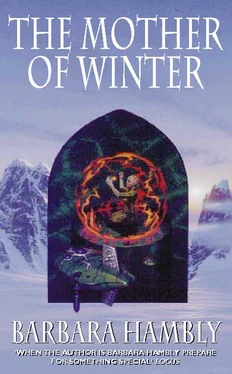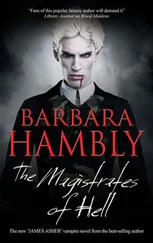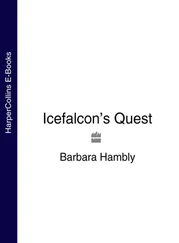He listened and scanned the edge of the woods, but could neither see nor smell any other dooic near. They hunted in bands and would bring down and slaughter a human being if they could, but Rudy knew that even without magic he could probably deal with a single attack. Man, I don’t need this, he thought tiredly, shifting his grip along the haft of his staff. See me tomorrow, pal, I’ve had a lousy day.
With a grunt, the dooic dropped to all fours. A moment later it settled to its knees and did something with its hand above a small pool of meltwater caught in the hollow of the rock.
And Rudy felt, strangely, the swift glimmer of something that almost seemed to be magic, like a drift of anomalous scent in the air.
MAGIC???
The old dooic moved away again, using its long forearms for speed, the whitish flesh beneath its fur a mottled blur as it reached the edge of the trees. It turned, staring upslope at him again, waiting.
Cautiously, ready for anything, Rudy came forward. Where the dooic had knelt by the meltwater, Rudy bent down—one eye still on the trees—and looked into the water.
In it he could see the pallid, fungoid shapes of the gaboogoo, as if in a scrying stone, moving away through the thick darkness of the woods.
“Jesus H. Christ on a bicycle.” Clouds overhead covered the moon, but as a wizard Rudy could see clearly, and the tiny pool had definitely been ensorceled to show the gaboogoo departing. Rudy half recognized the woods through which they passed, downslope and to the north in the hardwoods of the lower forest, toward the Arrow River gorge. By the way they moved, he could tell they were following something, tracking something other than himself.
Movement at the edge of the woods made him swing around, ready for a fight, and he saw that a second dooic had joined the first, a female by the flat pale dugs protruding through the body hair, with an infant clinging to her belly and another on her back. Male and hinny turned at once, ran a few steps back into the trees, then turned again, waiting for him. This time Rudy could almost see the flickering of magic—not human magic, but magic of some sort—that trailed from the old male’s fingers as it beckoned him impatiently to follow.
Cast from my fist, shining in the sky,
Brown wings lift and carry you from me.
With earthbound hooves I trace the road you fly …
“Gil?” Gentle and uninsistent, the word seemed to come, not from Ingold, but from some darkness in her mind, the thought taking shape in the abyss of a bottomless well. Holding to the poem as to a lifeline in terrifying darkness, Gil managed to nod, to let him know that she heard, but she could not speak.
In a sense, she was still aware of the broken stone walls of an old stable around them—the house to which it had been attached consisted these days of a couple of charred walls overgrown with birch saplings—the rusted black scrollwork of the manger near her head. The smoke of the fire Ingold had built in a corner stung her eyes; she heard the far-off howl of wolves and the soft, restless blowing of Yoshabel’s breath.
But it was as if all those images, that awareness, came to her down a cable from the bright surface of water through which she was slowly sinking, swimming deeper and deeper toward a lightless and terrible depth. As Ingold’s spells drew her farther into the dark, her mind gyred back to images of the UCLA campus in Westwood, to the words of poems—Donne, Villon, Minalde’s favorites Kaalis and Seredne, whom she, too, had come to love. Anything to avoid the fear that she sensed lay at the foundation of her dreams.
His magic was like the warmth of the fire, reassuring her with his measureless calm.
“What do you see, Gilly?” he asked. “What do you see?”
The wide lake upon whose stone verge she stood steamed like a cauldron in the air’s cruel chill. In contrast to most of her dreams, Gil felt the cold and smelled the sulfurous tang of the waters: the jewel-indigo of enormous depths, an almost perfect circle miles across, ringed by a toothed wall of high lava escarpments. Steam drifted across a verge of reddish-black basalt, smeared near the shores with garish lichens—purples, golds, virulent reds. A volcanic cone, she thought. And above her a second volcano reared, infinitely tall, crowned with ice. All things, she knew—she didn’t know how she knew—were ice-covered beyond the rim of those encircling cliffs.
Something crawled across her foot. It was another of the blubbery hat-shaped things Thoth had found. Like odd slugs with their calcined rosettes, they were creeping everywhere on the few yards of basalt beach that separated the sharp rise of the crater rims from the night-blue waters to her left.
Things like small scorpions, armed but legless, tails upcurled, floated above the steaming waters. The only sound was the groaning of the wind in the rocks.
“What do you see, Gil?”
She could not say.
An entrance squinted at her in the rock wall of the secondary cone, black, deadly; a tunnel into the mountain’s ice-locked heart. She could feel the cold on her face as she stepped into the rift, and knew that the volcano, huge and ancient, had a core of ice. In the rock chamber where the tunnel to the ice began there was a statue: cut of black basalt, a man sitting in a chair and gripping with one hand the collar of a dog. The bearded face was stylized, but even so it held an expression of profound sadness, and the sculptor had forgotten or chosen not to cut pupils in the staring eyes.
The anachronistic image seemed to float, detached, in a lake of white ground fog that surged utterly soundless around Gil’s knees.
Gil knew full well that this world filled with ice and silence had never been trodden by foot of man.
Ingold’s voice came to her, very far away now, asking something, she did not know what In any case, she could not have answered him. Even the memories of who she had once been seemed to have slipped beyond immediate recollection; whom she was seeking here, why she had come. Cold smoke flowed from a crack in the rock at the top of a flight of stone-cut stairs, and a smell of wet sweetness, sugary and attenuated. Gil followed, drawn by music she thought she had heard once before: music and the murmur of half-heard words.
They were speaking her name. How did they know her name?
At the top of the stair she looked down at her hands. She drew her dagger and slid the blade along her palms—the pain shocking even in the dream, but she could not help herself.
The voices grew clearer in her mind and she thought, My blood knows my name, and they are a part of the poison that’s in my blood.
They were telling her Ingold had caused her that pain, but even in her dream she knew that wasn’t true. As she walked deeper down the crack in the ice, the tension in her chest grew, the terrible anxiety tightening.
Looking down, she saw the dark bones of the rock, and through them, like horribly shining ropes, lines of tension and power in the ground, coursing into the earth.
Her blood dripped down onto the ice, hot against her cold fingers. Looking back over her shoulder, she thought she could see Ingold standing in the crevice that led to the surface of the ground, unable to cross its threshold. It was Ingold as he actually was—sometimes a glowing core of magic light, sometimes the arrogant, red-haired princeling who had caused the last of the great Gettlesand wars. Her lover. Her friend. The other half of her life. He held out his hand to her, but he could come no farther, and she could no longer hear his voice.
The singing filled her ears, and she followed.
The singers knelt in a world of lightless color, their magic shining into the ice of which the chamber was composed and reflecting back, allowing her to see. Glowing smoke surrounded them, rising from the fumarole in the chamber’s heart; not the smoke of volcanic heat, but the smoke of cold, for the chasm was filled with something that wasn’t lava, wasn’t water—something gelid, thick, clear as diamonds, something that moved in slow glutinous waves with the stirrings of that which dwelt within.
Читать дальше






